[Case 26] Community ESG Centers: Jobs for Older Adults in a Circular Economy
작성자 ADMIN
날짜 2024-12-31 10:37:20
조회수 1180
Community ESG Centers:
Jobs for Older Adults in a Circular Economy
With the population of individuals aged 65 and older in South Korea projected to surpass 10 million in 2025, the number of government-sponsored jobs for seniors has surged, reaching approximately 1.03 million in 2024. The benefits of employing older adults extend far beyond alleviating financial difficulties. These jobs improve various dimensions of their lives, including physical and mental well-being as well as fostering social connections. Notably, their social impact stands out in addressing public needs such as maintaining a clean and safe environment and safeguarding vulnerable members of society.
A growing trend in aligning senior employment with social benefits is the focus on upcycling and recycling initiatives. These efforts not only create meaningful job opportunities but also advance social values like resource sustainability and environmental conservation. A compelling example is the Community ESG Centers established across Busan City.
The Community ESG Center Project was co-developed by the Korea Labor Force Development Institute for the Aged (KORDI) and Busan City. These centers serve as hubs for producing and selling upcycled goods made from waste plastics and as educational venues aimed at promoting environmental awareness. While "ESG" traditionally stands for environmental, social, and governance—key criteria for assessing business sustainability—it also signifies "Eco Senior Group," reflecting the project’s mission to address environmental challenges through the active participation of older residents. The first center launched in December 2022 in Bugok-dong, Geumjeong District, followed by a second center in Choryang-dong, Dong District, in September 2023. By June 2024, the initiative had created 1,480 jobs for older individuals, as reported by a Busan City official in an interview with the Busan Broadcasting System.
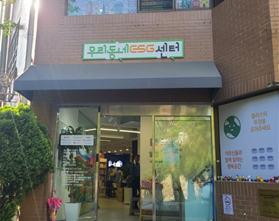
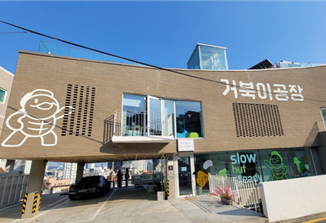
The first and second ESG Centers, located in Geumjeong and Dong Districts, respectively (from left to right) (Source: Official Blog of the Geumjeong District Office, Kookje Daily News)
The first Community ESG Center is managed by Elephant Factory, a social enterprise dedicated to fostering a circular economy for toys. At the center, older workers wash and sort waste plastic toys, bottles, and lids, which are then sent to recycling facilities for reprocessing and upcycling. Additionally, senior employees take on the role of environmental educators, conducting workshops on the circular economy and sustainability for local daycares, kindergartens, and elementary schools.
These workshops offer a variety of activities for local residents and students, such as making keyrings from waste plastics, hands-on sessions on disassembling waste toys for resource circulation, and cooking classes to explore climate change solutions.
The second center, managed by a social cooperative, serves as an extension of the first, specializing in the production and sale of upcycled plastic goods. Its operations include preparatory tasks for upcycling, such as removing metal parts and stickers from plastic toys. The center produces a range of items, including utility gloves, vests, and towels, crafted from nylon threads derived from scrap plastics. Additionally, the center manufactures upcycled flat LED panel lights and safety knobs, which are frequently distributed to vulnerable households, such as seniors living alone, through a partnership between the Korea Housing & Urban Guarantee Corporation (HUG) and Korea Southern Power Co., Ltd. (KOSPO).
Products designed specifically for older adults are marketed under the brand "Turtle Factory," symbolizing the steady and reliable contributions of the center's older staff, whose work ethic mirrors the slow but consistent nature of the proverbial turtle.
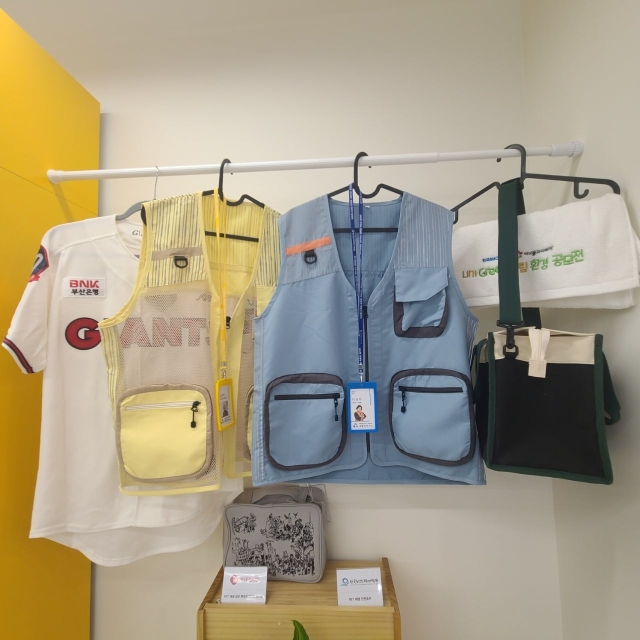
Upcycled Products Crafted from Recycled Plastic Waste
(Source: Official Blog of the Geumjeong District Office)
Jobs at the community ESG centers are generally categorized into two types: public service and social service. Public service roles focus on the collection of waste plastics, while social service roles involve sorting and washing the collected plastics and conducting workshops to promote environmental awareness. As of 2024, public service positions offer KRW 290,000 (approx. USD 196.30 as of Dec 27, 2024) for an average of 30 hours per month, while social service roles provide KRW 760,000 (USD 514.52) for an average of 60 hours per month. Despite the modest compensation, older employees report high levels of satisfaction, citing their work as rewarding and revitalizing. Many find that the jobs help them maintain their health, build a sense of self-worth by contributing to environmental sustainability, and foster new friendships.
One noteworthy public service initiative is "Circular Economy Champions," launched in May 2024 to expand plastic collection efforts. The program engages 668 members from six senior clubs across Busan, who sort and wash plastics collected from various locations, including 83 subway stations. These prepared plastics are then transported to the centers for upcycling via waste collection services.
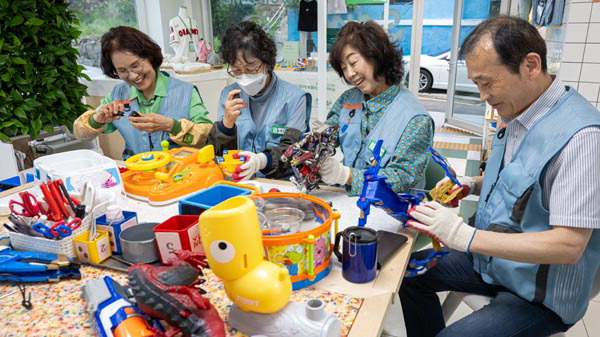
Older staff disassembling waste toys (Source: Kookje Daily News)
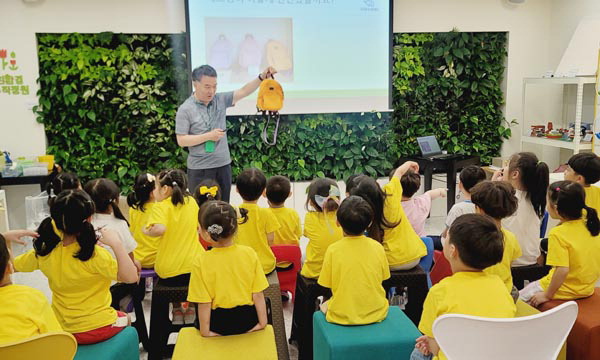
A senior instructor leading a circular economy class for children (Source: KORDI)
The Community ESG Center Project stands out for its collaborative efforts involving a diverse range of stakeholders from both the public and private sectors. As previously mentioned, the initiative was spearheaded by two key public entities, Busan City and KORDI. Specifically, KORDI’s Busan-Ulsan branch oversaw the project’s planning and overall management, while Busan City handled budget management and public outreach.
The success of the centers has been strengthened by the contributions of several other stakeholders. Lotte Chemical, a leading petrochemical company, provided technical expertise for plastics reprocessing and upcycling. HUG and KOSPO played a key role in distributing upcycled products to vulnerable households, while Korea Housing-Finance Corporation offered financial support for manufacturing and training programs to develop environmental instructors.
Equally noteworthy is the support for physical infrastructure: the properties housing the first and second centers were generously made available courtesy of Busan Metropolitan Corporation and Dong District Office.
One of the hurdles local governments often face when launching and operating new projects is securing adequate funding, a challenge this project successfully navigated through strategic collaboration with diverse stakeholders. In 2023, the project’s total budget of KRW 1.99 billion (USD 1.34 million) was funded by contributions from Busan City (KRW 510 million or USD 345K), KORDI (KRW 520 million or USD 352K), and corporate donations (KRW 960 million or USD 650K). The city’s proactive efforts extended into 2024, successfully securing an additional KRW 910 million (USD 616K) beyond municipal funds through persistent discussions with key partners. Busan City has reaffirmed its commitment to securing further funding for the project by continuing vigorous promotion and collaboration.
Community ESG Centers are set to expand further across Busan City and beyond. Following the opening of the third center in Haeundae District in November 2024, the fourth and fifth centers are scheduled to launch in Yeong-do and Jung Districts by the end of the year. Looking ahead, the city plans to open five additional centers in 2025 and six more in 2026, fulfilling its vision of establishing at least one ESG center in every district and town throughout Busan.
The project’s influence is spreading beyond Busan, with Incheon City emerging as the second municipality to introduce an ESG Center. Currently in pilot operation in Michuhol District, this new center was realized through a partnership between KORDI, Michuhol District Office, and Lotte Chemical. Like its counterparts in Busan, it is designed to function as both a senior employment hub and a communal space for local residents.
The Community ESG Center Project has distinguished itself as an innovative role model, effectively addressing the dual goals of job creation for older adults and environmental sustainability. Its foundation of robust collaboration among local governments, public entities, and private organizations has been instrumental to its success. Older participants not only gain job stability and a sense of fulfillment but also engage in meaningful intergenerational interactions through their work. As a proven model that advances social values such as active aging, environmental stewardship, and generational harmony, the project is poised for nationwide expansion, promising an even greater societal impact.